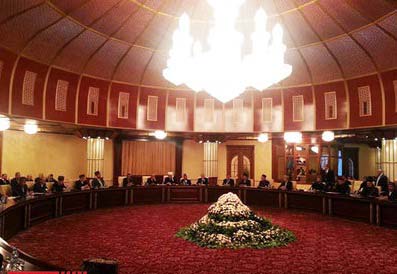
“The martyrdom in Islam religious is the highest peak of struggle for faith, just and homeland. Being killed for homeland is the greatest honor and dignity,” reads the fatwa issued by the Gazi Council of the Caucasian Muslims Office and quoted by Azeri-Press Agency (APA) on Tuesday, January 28.
“A person who was killed for land, religious, family, homeland is a martyr. Main requirement of the Islam religious is self-defense against aggressors,” the fatwa adds.
According to the fatwa, the main condition for jihad and martyrdom in Islam is self-defense.
It was urged after report about a growing number of young men joining armed conflicts in several foreign countries.
The fact that in such a situation some citizens are involved in armed conflicts, clashes and religious groups against civilians in other countries supposedly for religious reasons, contradicts the essence of Islam, according to the fatwa.
“We are dissatisfied with calling acts of our countrymen, who joined armed conflicts in other countries, as jihad, their physical destruction as martyrdom. CMB Cadi Council states that including acts of these persons in martyrdom is groundless,” the fatwa said.
“We all owe our lives to the martyrs of 20th January, Karabakh therefore, we should to immortalize our martyrs and cite them as example to the next generation,” it added.
January 20 in Azerbaijan commemorates Black January in 1990, when Soviet troops entered the city of Baku and killed more than 180 civilians. It is celebrated as the rebirth of the Republic of Azerbaijan.
It is also a remembrance of the victims of the Nagorno-Karabakh War in 1988. This day in Azerbaijan is also known as Qara Yanvar (Day of National Mourning), Day of Shehids (martyrs), or Remembrance Day.
Muslims, mostly Shiite, make up more than 93 percent of the former Soviet republic’s population of 8.3 million people.
The rest of the population adheres to other faiths or are non-religious.
Last June, prominent Sunni Muslim scholars from across the Arab world called Jihad against Al-Assad, describing his crackdown on anti-regime protests as a war on Islam.
Leading among attendees in the meeting were Sheikh Yusuf Al-Qaradawi, the president of the International Union for Muslim Scholars, and Sheikh Hassan al-Shafai, from Al-Azhar.
Qaradawi has also called on Sunni Muslims to join opposition forces in their fight against Assad’s regime.
In April 2013, two Salafi scholars in Lebanon have called for Muslims to join the Syrian opposition to fight against Assad’s regime over Hizbullah’s involvement.
Following repeated fatwas, thousands of foreign fighters are believed to have joined the war against Assad’s regime in Syria.
However, the fatwa agreed with the opinion expressed by Saudi Arabia's grand mufti, the highest religious authority in the birthplace of Islam, last October when he urged young Saudis to refrain from fighting in Syria.
TNA